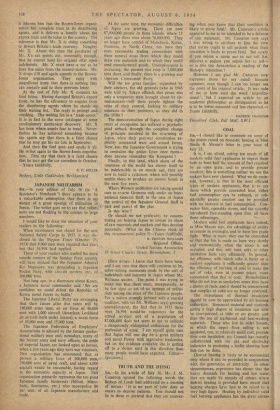JAPANESE MILITARISM SIR,—In your edition of July 16 (in '
A Spectator's Notebook') there appears to be a remarkable assumption that there is no danger of a great upsurge of militarism in Japan. The writer goes on to say that volun- teers are not flocking to the colours in large numbers.
I would like to draw the attention of your readers to the following: When recruitment was closed for the new National Safety Corps in 1953, it was dis- closed in the Nippon Times (October 25, 1953) that 8,000 men were required that year, but that 56,994 had applied.
Those of your readers who studied the more remote corners of the Sunday Press recently will have noticed that the Japanese Admiral Ko Nagasawa was demanding a Japanese Pocket Navy, with aircraft carriers, etc., of 300,000 tons.
Not long ago, in a discussion about Korea, a Japanese naval commander said ' We are confident we could defeat the Republic of Korea naval forces in battle.'
The Japanese Liberal Party are envisaging that their forces after five years will be 190,000 army men, an air force of 40,000 men with 1,000 aircraft (American Lockheed jet aircraft built under licence), a naval force of 45,000 men and 15,000 tons. At the same time, the economic difficulties of Japan arc growing. There are now 87,000,000 people in these islands, where 15 years ago there were about 70,000,000. They no longer have control of Manchuria, Korea, Formosa, or North China; nor have they even reasonable trading connections with these natural areas from which they could draw raw materials and to which they could send manufactured goods. Unemployment is increasing, the present rice crop is 2,000,000 tons short, and finally, there is a growing and vigorous Communist Party.
Will the ten great families, supported by their advisers, the old generals (who in 1945 were told by Tokyo officials that peace was only a temporary state brought about by cir- cumstances)—will these people tighten the reins of their control, looking to military solutions to their problems, as they did in the 1930s ?
The democratisation of Japan during eight years of occupation has suffered a psycholo- gical setback through the complete change of principle involved in the re-arming of Japan, when their post-war constitution ex- plicitly renounced wars and armed forcea.
Now, too. the Japanese Government is trying to centralise the police force once more— does anyone remember the Kempetai ?
Finally, in this land, which alone of the countries of the world has shown itself to be indefensible in an atomic age, they are now to build a cyclotron, which will possibly enable them to produce an atomic bomb in the next five years.
Where Western politicians are taking special care to re-arm Germans only under an Inter- national General Staff, in the case of Japan the revival of the Japanese General Staff is part and parcel of the plan.
Is this wise ?
Or should we not preferably bc concen- trating on helping Japan to obtain its share of raw materials and markets and thus develop peacefully. (What do the Chinese think of this re-armament policy ?)----Yours faithfully,
R. DENTON WILLIAMS
Regional Officer, United Nations Association 10 Great Charles Street, Birmingham, 3 4Strix writes: I know that there have been, and I am sure that there will continue to be, sabre-rattling statements made by the sort of individuals and interests in Japan whom Mr. Williams quotes. The point I was trying to make was that there seem, unexpectedly, to be few signs as yet of an upsurge of milita- rism among the mass of the Japanese people. For a nation strongly imbued with a martial tradition. with (as Mr. Williams says) growing unemployment, the fact that in 1953 there were 56,994 would-be volunteers for the armed services out of a population of 87,000,000 does not seem to me to indicate a dangerously, widespread enthusiasm for the profession of arms. I am myself quite sure that Japan will one day be a great military and naval Power with aggressive tendencies; but on the evidence available she is getting off to a slower start in this direction than many people would have expected. Editor— Spectator.]


































 Previous page
Previous page